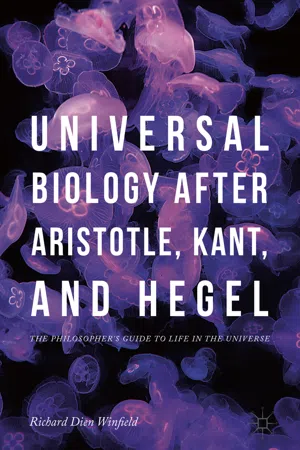Life
is an unfathomable mystery
for anyone who attempts to comprehend it by using the categories suited for conceiving the mechanics
of matter in motion, the physical processes
of electromagnetism, and the chemical interactions
of different atoms and molecules. Although life
incorporates all of these natural phenomena, the essential life
functions exhibit uniquely biological processes that are irreducible to the inorganic factors of which living things are composed and with which they interact.
The complementary functionality of the organs
of the living individual involve an internal teleology
where each part of the organism is both means and ends to its counterparts, sustaining them and thereby sustaining itself, while allowing the whole life form to function for the sake of continuing its own operations. Whereas inorganic entities are subject to lawful relations that determine them from without with indifference to what they are, the organic unity of the living thing upholds itself by its own differentiation into mutually supporting organs
whose functions are intrinsic to the specific nature of the organism.
Similarly, the metabolism
of living things relates them to their environment so as to sustain the metabolic activity of the organism, whereby it exchanges material with what lies outside, assimilating factors that become integrated into the ongoing metabolic process. By contrast, the mechanical, physical, and chemical interactions
of inorganic factors neither perpetuate themselves, nor enliven their constituents, but instead succumb to the march of entropy
, in which order gives way to disorder. Metabolism
makes resistance to entropy
an enduring occupation of life
, which always strives to maintain its active self-organizing unity.
Finally, the reproduction
of organisms enables life to give itself a species
being, consisting in the propagation of unique living individuals who generate others of the same kind. Inorganic entities can do nothing of this nature. Admittedly, the evolution
of species
may reflect external contingencies, involving astrophysical
, geological
, chemical, and physical factors that influence the production of mutations
and the survival of certain genetic varieties. Nonetheless, evolutionary development can solely proceed upon the basis of self-sustaining entities that maintain themselves as not just individuals, but members of natural kinds that aim at perpetuating themselves.
In all these life processes, organic nature exhibits a self-organizing and self-sustaining character that transcends the external necessitation of efficient causality
, where factors are determined from without with indifference to their essential nature. The natural reality of living things does involve manifold contingencies that only empirical observation can apprehend. Life, however, does have an essential, universal
nature that philosophy
can investigate. Reason can explore what is constitutive of life in general as well as what are the fundamental particular forms that life can take wherever in the universe living things may arise. In pursuit of this exploration, philosophy
can develop a universal
biology
transcending
the contingencies of life on earth, where living things happen to be carbon-based and infused with RNA
and
DNA.
Aristotle
, Kant
, and Hegel
, three of our greatest earthly philosophers, have already provided important contributions to universal
biology. We do well to stand upon their broad shoulders and use their conceptions to think through how nature becomes a biosphere
in which life can arise and flourish, what are the basic life processes common to any organism, how evolution
can give rise to the different possible forms of life, and what distinguishes the essential life forms from one another. In pursuing this task, we can come to understand our own biological origins and make intelligible how nature can engender rational animals capable of conceiving its true character.
The following work attempts to provide a philosopher’s guide to life in the universe, building upon the seminal achievements of Aristotle
, Kant
, and Hegel
, with the aid of some more recent theorists. Our goal is to develop an outline of universal biology
, providing the crowning consummation of the philosophy of nature.
This work is the sequel to my recent book, Conceiving Nature after Aristotle, Kant, and Hegel: The Philosopher’s Guide to Nature, which attempts to think through the universal constitution of nature to the point where nature becomes a biosphere
in which life emerges and makes possible our undertaking the philosophy of nature.1 Although that preceding work provides important foundations on which the investigation of life depends, rational animals
anywhere in the universe need only look at themselves and their own environment to make sense of the following exploration of universal biology.
Bibliography
- Winfield, Richard Dien. 2017. Conceiving Nature After Aristotle, Kant, and Hegel: The Philosopher’s Guide to Nature. Cham: Palgrave Macmillan.
Footnotes
1
Richard Dien Winfield, Conceiving Nature after Aristotle, Kant, and Hegel: The Philosopher’s Guide to Nature (Palgrave Macmillan, 2017).
